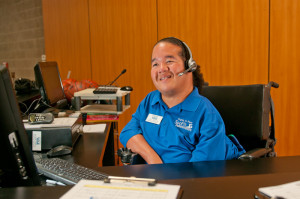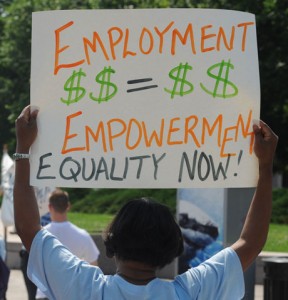The LEAD Center, in collaboration with the National Council for Independent Living (NCIL), established a community of practice (COP) on employment and economic advancement to provide peer-to-peer mentorship, training and technical assistance to Centers for Independent Living (CILs) and their local American Job Centers (AJCs). Ongoing trainings and discussions will support economic advancement for CIL and AJC customers seeking employment and engaged in the workforce. The goals for the community of practice are to:
- Create a sustainable forum to enable staff at CILs and AJCs to learn from each other and work collaboratively to improve the employment and economic advancement of customers with disabilities.
- Provide training and technical assistance to CIL and AJC staff to build their capacity to implement economic advancement strategies that remove barriers that keep people with disabilities from getting and keeping jobs.
- Develop and disseminate guidance to educate and train job seekers and the people who support them at AJCs and CILs so that they can get support to become employed, retain employment, and become financially secure.
In March, the LEAD Center led the first discussion forum with the five CILs (Disability Rights and Resources in Birmingham, Ala.; IndependenceFirst in Milwaukee, Wisc.; Paraquad in St. Louis, Mo.; Montana Independent Living Project in Helena, Mont.; and Community Resources for Independent Living in Hayward, Calif.). The participating CILs collaborated with AJCs and the LEAD Center in a first-of-its-kind pilot project in 2013. The new COP builds on the progress and best practices learned from last year’s pilot to address challenges that create barriers to obtaining and maintaining employment, which impede the financial stability of people with disabilities across both systems.
To complement the COP and build on best practices from last year’s CIL pilot project, the LEAD Center is preparing to release a toolkit in the next quarter that CILs and AJCs can utilize to facilitate closer partnerships and understanding that lead to better outcomes for jobseekers with disabilities.
To learn more about the COP, please contact Elizabeth Jennings, LEAD Center Assistant Project Director, [email protected].



 Highlights from the report include:
Highlights from the report include: CareerACCESS pilot projects in up to five states could revolutionize how seamless services and supports come to youth who are eligible for the SSI program (Social Security’s Supplemental Security Income program). CareerACCESS is a policy project partnership between NCIL, the World Institute on Disability, and PolicyWorks.
CareerACCESS pilot projects in up to five states could revolutionize how seamless services and supports come to youth who are eligible for the SSI program (Social Security’s Supplemental Security Income program). CareerACCESS is a policy project partnership between NCIL, the World Institute on Disability, and PolicyWorks.
